South Indian Folk Dances are rich in content, unique in conceptualisation, deep-rooted in tradition and meaningful in expression and execution. These dances express joy, vigour, valour and simplicity. Some of them are minimal as far as movement in concerned, while others are sprightly and fleet-footed. A few dance forms make use of masks, while the costumes, broadly, are flamboyant and innovative. Most of these dances are performed during traditional local festivals, with the traditional dancers swaying to the beats of drums, trumpets and various indigenous musical instruments However, while a few of these dances have continued to enthrall the audiences with their rare displays of skill, splendour and panache, many of them are unfortunately on the verge of extinction.
Kummi (Tamil Nadu)
Kummi is a popular rhythmic dance in Tamil Nadu and some places in neighbouring Kerala. It is essentially an imitative and symbolic dance that is practised during annual festivals. The highlight of Kummi is the relative absence of musical instruments, with more reliance on the clapping of hands in perfect sync and rhythm. This sets the tone for the women dancers, who are normally in a circle, to join the chorus singers. The dance is usually performed to depict the perfect harvest season as also the onset of menarche (of a girl).
Kollatam (Andhra Pradesh)
Kollatam, or ‘stick dance’, is popular in the Prakasam district of Andhra Pradesh. The dance, which is performed during village festivals, resembles the Dandiya (dance) of North and West India, with dancers - numbering from 8 to 40 - forming concentric circles. The dancers synchronise their movements in pairs - the outer circle dancers strike their sticks with the dancers of the inner circle, producing a melodious sound.
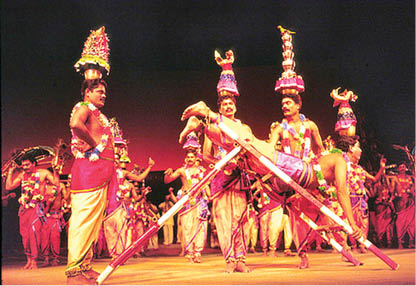
Karagattam (Tamil Nadu)
Karagattam is an ancient dance form that is performed mainly in Madurai and Tirunelveli districts of Tamil Nadu. The dancer seeks the blessings of the Rain-Goddess Mariamman (Parvati). Karagattam is performed for both entertainment and spiritual reasons. The dancer places an earthen or metal ‘karagam’ (pot) filled with water on his/her head. This is a dance performed individually as well as in pairs. Karagattam involves an intricate balancing of the pot (which is adorned with flowers and has a paper parrot perched on top), while the dancers, attired in multi-coloured costumes and make-up, dance to the beats of drums and pipes.
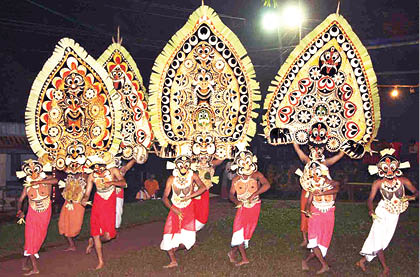
Padayani (Kerala)
Also known as Padeni, Padayani is a dance that is believed to cure illnesses. Padayani is popular in Kollam, Allapuzha and Kottayam districts of Kerala. It is traditionally performed to the beats of the musical instrument Thappu (drum) and cymbals. Padayani literally means ‘a row of warriors’. The dancers wear masks called kolams. Padayani performances also symbolise the killing of the demon Darika by Goddess Kali.
Garadi (Puducherry)
When Lord Rama and his army of vanaras (monkeys) defeated and slew the demon king Ravana, it is believed that the vanaras danced with joy. In Garadi the dancers are dressed up like monkeys. They dance with sticks in their hands, while they wear iron rings called ‘anjalis’ on their legs. Big drums, Ramadolus, are played in the background.
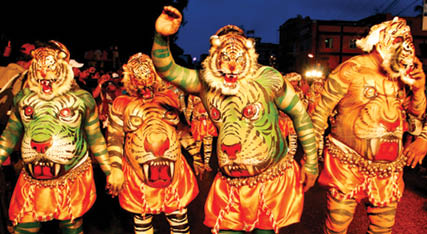
Puliyattam (Tamil Nadu)
Puliyattam is a dance that is performed in Tamil Nadu during cultural festivals. A group of around six men growl and snarl, imitating a tiger, as they dance to the beats of the drums. This dance is performed as Pulikali in Kerala, and is also popular in Karnataka. The bodies of the dancers are painted in yellow colour and embellished with black stripes, whiskers and eye paint – to resemble tigers. Nowadays, dancers have begun to wear yellow-black body fitting suits, which come with a tail and paws.
Perini Thandavam (Telengana)
The Kakatiya rulers of Warangal used to pray to Shiva before embarking on battles. The tradition, though declining, has continued through Perini Thandavam - a warrior dance. Once well into their performance, the dancers begin to dance vigorously, as it is believed that the power of Shiva is being transferred into their bodies.
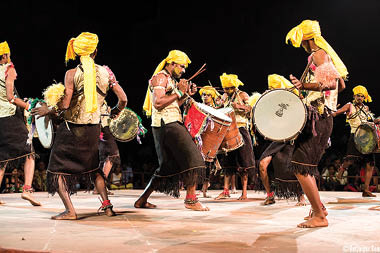
Dollu Kunitha (Karnataka)
This is a drum dance of Karnataka. The dance is based on the legend that the demon Dollasura’s stomach was ripped open by Lord Shiva, whom the demon had swallowed. Shiva then skinned him and made (from the skin) a dollu (drum), which his ganas (servants) were ordered to play. Around twelve artistes become dancing partners as they sway to the sounds of the flute, trumpets and other local instruments.
Poikaal Kuthirai (Tamil Nadu)
Poikaal Kuthirai, or ‘dummy horse’, represents one of the oldest Tamil dance traditions and is performed primarily for entertainment (especially in villages). The dancer is decked up in colourful attire and a dummy horse is bound on his/her waist. The dance is performed by both males and females, with some variations in style. Some dancers stand and balance themselves on wooden pegs, while moving the dummy horse rhythmically - both vertically and horizontally. The accompanists deftly play the Nadaswaram (pipe) and the drum (with drum-sticks).
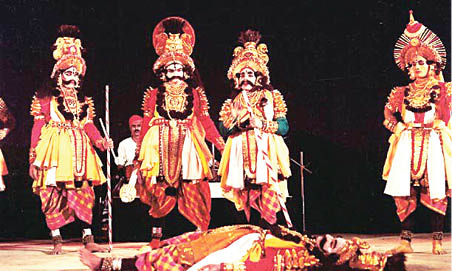
Bayalata (Karnataka)
Bayalata is another variation of the Yakshagana, which is an opera style performance of Karnataka theatre, music and dance. Bayalata is based on Indian epics and is staged during the culmination of the harvest season. The stage, having an ethnic thatched roof, is set in open fields. The performers mimic the characters of Indian mythology.
Read More...